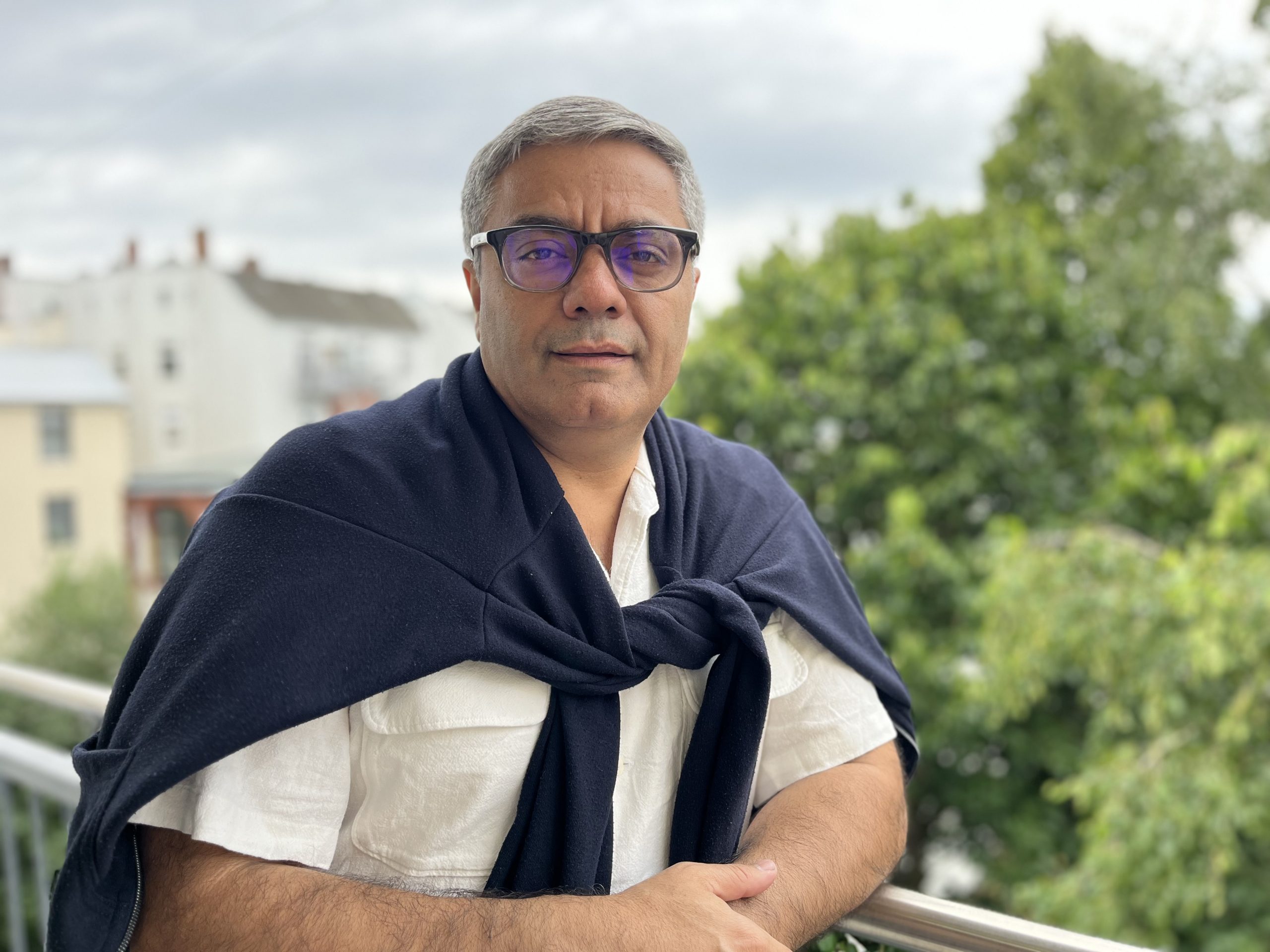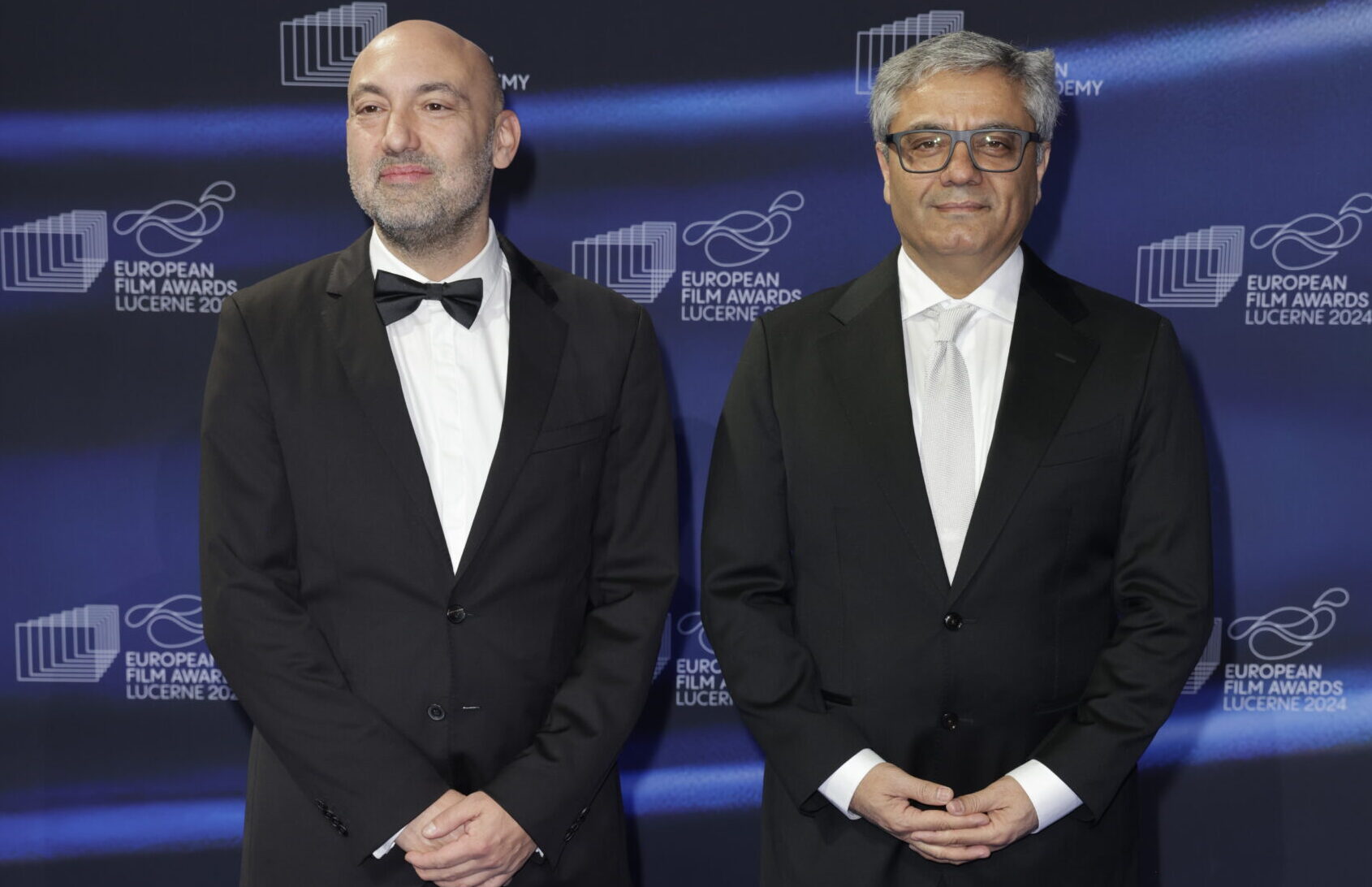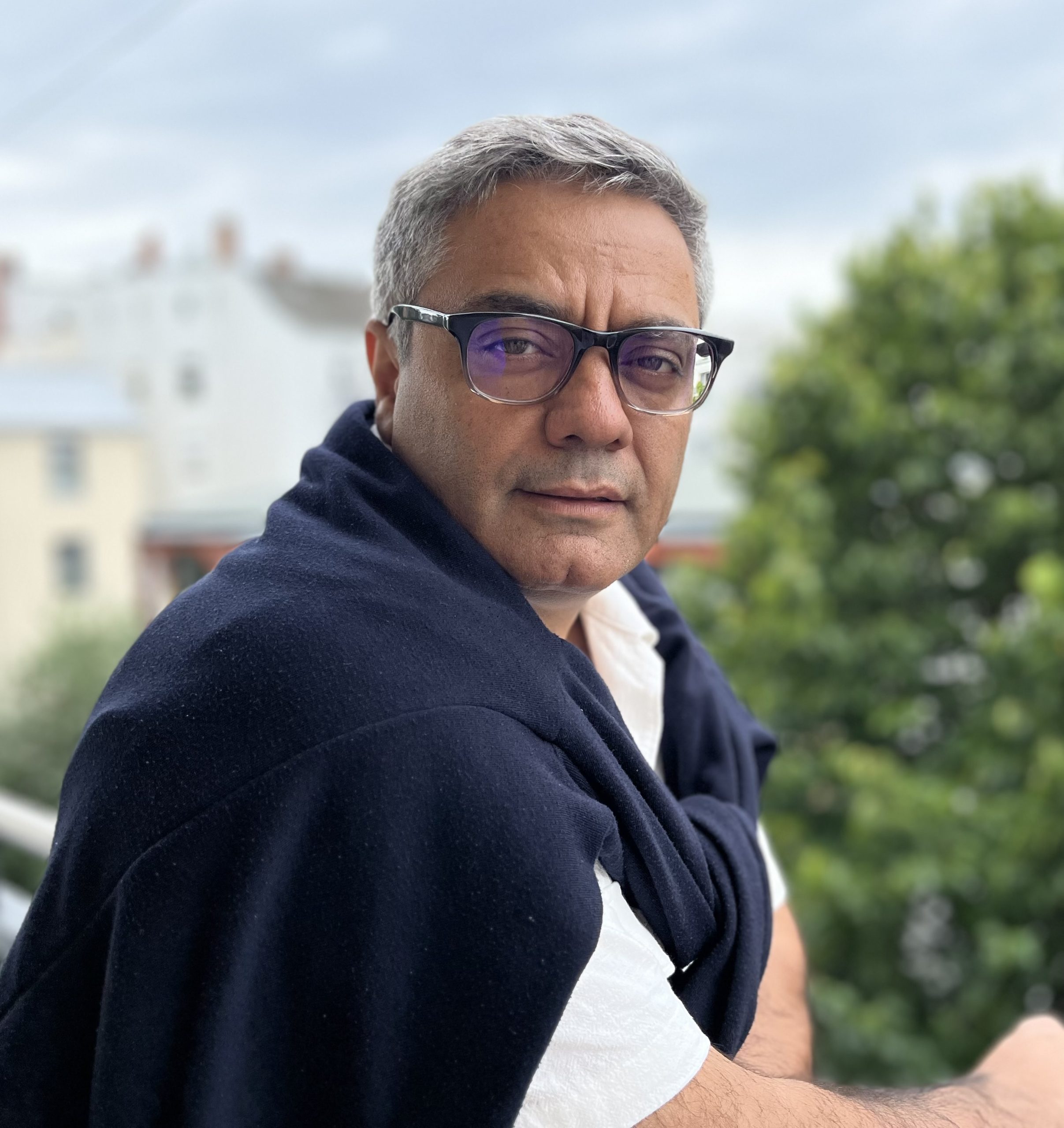Talking with filmmaker Mohammad Rasoulof: Sentenced to Prison in Iran, Representing Germany at the Oscars
Director Mohammad Rasoulof, who fled his native Iran last year, shared in detail his experiences creating his latest film, The Seed of the Sacred Fig. Produced in secret, the film has won multiple awards at Cannes and been nominated for European Film Awards and Oscars. Rasoulof discussed the challenges of working under an oppressive regime, political cinema, and integrating into the Western film industry.
The confirmation for the interview with Mohammad Rasoulof came via email the night before the European Film Awards gala, which took place on December 7, 2024, in Lucerne. I attended as a journalist and film critic. That afternoon, I went to the hotel where the nominees were staying for a roundtable discussion with the Iranian director, who narrowly escaped his country in May 2024, just after being sentenced by authorities to eight years in prison and flogging for “crimes against national security.”
This wasn’t his first sentence. In 2022, Rasoulof had also been sentenced to almost a year in prison and banned from working for two years, accused of creating films that constituted “propaganda against the system.” In 2020, he won the Golden Bear at the Berlin Film Festival for There Is No Evil but was unable to attend the ceremony due to a travel ban imposed by Iranian authorities. The film explored the controversial topic of capital punishment in Iran through four interconnected stories.
Over the years, Rasoulof has been one of Iran’s most vocal artistic critics of the regime’s repression of dissent, particularly amid the massive protests following the death of Mahsa Amini in police custody for allegedly wearing her hijab improperly. Tragedies such as the collapse of a building in southwestern Iran in 2022, which killed 40 people, have also fueled protests. According to Human Rights Watch, Iranian authorities have repeatedly arrested Rasoulof and confiscated his passport because of his work. His latest films have been direct critiques of the authoritarian regime in Iran.
The Seed of the Sacred Fig, a co-production between Germany, France, and Iran, received three nominations at the European Film Awards (European Film, European Director, and European Screenplay). At Cannes, it won the Special Jury Prize, the FIPRESCI Prize, and the Ecumenical Jury Prize. Additionally, the film was chosen as Germany’s entry – where Rasoulof has now settled – for Best International Feature Film at the 97th Academy Awards, gaining the nomination in the end.
Rasoulof attended Cannes in May 2024, immediately after fleeing Iran. Since then, he has been on a nonstop international tour with his film, attending major festivals and award ceremonies worldwide. At the European Film Awards, the roundtable interview I attended was his third of the day, followed by at least one more individual interview – clear signs of the media’s immense interest in one of the most compelling filmmakers of the moment.
The Seed of the Sacred Fig Tree revolves around an investigative judge in Tehran grappling with paranoia amidst political unrest. When his firearm goes missing, he suspects his wife and daughters, imposing draconian measures that strain familial bonds as societal norms collapse.

Calm, serene, and smiling, Rasoulof answered all questions concisely and incisively, with his comments in Farsi translated into English by an interpreter. Speaking about the origins of his film, Rasoulof explained that it wasn’t directly inspired by the 2022 protests in Iran. The idea had older roots and was tied to his own experiences: “Over the last 15 years, I’ve had many interactions with people working in Iran’s censorship apparatus, security forces, and judicial system – censors, interrogators, prosecutors, judges, and prison guards. I was constantly wondering about them: What enables them to collaborate with the system? Could there even be a biological difference about them?”
“Then, I was in prison, and at the height of the ‘Women Live Freedom’ movement (i.e. the protests following Mahsa Amini’s death), I had a chance encounter with a senior prison official. He confided in me, expressing deep shame about his job, saying he was even thinking about taking his own life, and that his children kept criticising him harshly, asking how he could collaborate with the system. That’s when I thought it would be interesting to tell a story about a family experiencing such a big rift,” the filmmaker explained.
Rasoulof, an admirer of documentaries, noted that he often draws inspiration from real events and personal experiences in his films. As a result, it felt natural to include real footage in The Seed of the Sacred Fig, depicting street protests and their violent suppression by security forces, which deeply moved him.
I used a lot of metaphors in my early films. But then I realised I was using them out of fear, knowing what would happen if I spoke more directly
When asked about the use of metaphors and allegories in his films – less prominent in The Seed of the Sacred Fig – Rasoulof reflected on how his early work was influenced by Iranian poetry and literature. “Iranian literature developed under highly repressive circumstances, and so is replete with metaphors, because it was the way to express certain things,” he said.
“So, I used a lot of metaphors in my early films. But then I realised I was using them out of fear, knowing what would happen if I spoke more directly. Over time, I reached a point where I decided that if I used metaphors, it wouldn’t be to escape my fears but purely to play with form and as a means of free artistic expression. That’s how I approached this film,” he added.
In his view, the rift within the family stems from “the conflict between tradition and modernity,” set against the deeply rooted influence of patriarchy in Iranian society, represented by the protagonist. This is why he chose to set the final part, where the man hunts his wife and daughters, against the backdrop of a ruined village. “When we get to the village, to the ruins, to this cat and mouse chase, we understand that this struggle between tradition and modernity has been ongoing throughout Iranian history and will continue,” he said.
Regarding the structure of the film, which transitions from family drama to thriller, Rasoulof explained that, as he is constantly searching for artistic freedom, it was fitting to grant the film a certain formal freedom as well. “On the other hand, I was convinced that I might never complete the shoot of the film, so I told myself I might as well do whatever I wanted just to have fun. It was a kind of inner revolt, a need to defy any restriction to break free,” the filmmaker elaborated.

Since the film was made under the radar of Iranian authorities, Rasoulof was absent from the set for much of the shooting, relying on two assistants to work with the actors and technical crew. They had to be prepared for anything. “We had a very precise script and plan and did everything we could to stick to it. At the same time, we were ready for the fact that we might have to change anything at any moment. I think there’s this pent-up, saved-up creativity inside of me ready to function if need be. I really enjoy when something unexpected happens, and we have to adjust, even though it confuses everyone,” Rasoulof said.
At the end of each day, he hid the raw footage and secretly transferred it to a friend and collaborator abroad – British editor Andrew Bird – who agreed to work without a formal contract. “I told Andrew that we might not complete the shoot, that we might not have a film, but he understood and accepted because we had worked together before. Still, I wasn’t sure it would work since he doesn’t speak a word of Persian, so I wondered how he would edit the film. All he had were the raw footage and the script. He started editing as soon as I sent him the rushes from the first day of the shoot. By the tenth day of shooting, he sent me the first cut sequence. That’s when I realised he could do it, though I had no idea how. To this day, he wouldn’t tell me.”
“When my prison sentence was announced, the definitive one, with no possibility of appeal, Andrew and I had reached the rough cut version of the film. At that point, I called him, the producers, and other collaborators abroad and told them that from now on, I wouldn’t be able to communicate with them and didn’t know if or when I could resume communications. It’s now up to you, and you have to finish the film no matter what,” the filmmaker confessed.
Reflecting on his cinema, Rasoulof said that as a young aspiring filmmaker, he never thought his films could be considered dangerous by his country’s regime, he just wanted to be a filmmaker “who would have an impact on his society.” “I didn’t want to be indifferent to my surroundings. Human values have always been very important to me. I don’t just want to tell a simple story to entertain people. At the same time, I was aware that I was engaging in a genre with a limited audience. But I didn’t know that politics would cast such a long shadow over me and view my films as so dangerous,” he said.
Asked about what he believes defines a political film, Rasoulof stated that when “you’re dealing with a totalitarian regime like the one in Iran, politics takes on a different meaning because everything is political. You have a totalitarian regime that tries to control everything. For example, in Tehran, even talking about the weather is a political issue. Then, what women wear, the colour of their hair – everything is political. In democratic circumstances, the term ‘politics’ is slightly more restricted. The same goes for what could be considered a political film.”

In terms of future work, the director says, “Any film I make about Iran will inevitably be a political film. Now I’m here (in the West – ed.), but my case hasn’t changed, so I’m fairly certain that I’ll continue making films in the same vein. At the same time, I hope my future films will have a broader perspective and not necessarily focus solely on Iran.”
When asked if the youth in Iran could make a difference in the country, Rasoulof expressed confidence that this generation has already brought about major changes in the past two years: “The most important thing is that it has ripped the mask off people’s faces, in the sense that, under a totalitarian regime, you always have to hide who you are, pretend to be someone else. But now, people are no longer pretending. It has also made it very clear to the regime and older generations just how low the regime’s legitimacy is within the country. Of course, the regime has always known this, but it used to believe it might have a chance, might find a way. Now it’s very clear to them that their legitimacy is at an all-time low.”
He also expressed gratitude that The Seed of the Sacred Fig was chosen as Germany’s entry for Best International Feature Film at the Academy Awards. “I never thought I’d be doing an Oscars campaign – organising screenings and meetings, hosting receptions with voting members of the Academy. In my mind, it was always very clear that the Islamic Republic would never send my film to the Oscars, so I never considered it. I feel like I’ve suddenly been plunged into an entirely new experience, from which I’m learning a lot,” he explained.
“Just the fact that Germany submitted my film for the Oscars makes me wonder why I never thought about this before. Why did I only think of myself as Iranian? Why did I limit myself to that geography? So, it’s a very beautiful human gesture that truly strengthens and inspires me. I often look at my travel document provided by Germany and think that if this piece of paper managed to take me to all these places, into this entirely new life situation, then why can’t cinema do the same? It certainly can,” the filmmaker concluded.
“The Seed of the Sacred Fig” will be distributed in Romania by Bad Unicorn on January 31.
Journalist and film critic. Curator for some film festivals in Romania. At "Films in Frame" publishes interviews with both young and established filmmakers.
